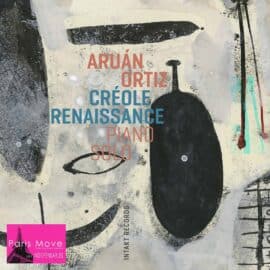| Jazz |

Recorded over two concentrated days, December 17 and 18, 2024, this release marks the second solo piano album from Cuban-born, Brooklyn-based composer and pianist Aruán Ortiz. What he offers here is not an easy listen, nor is it meant to be: these are works of formidable depth, forged from an intellectual inquiry that refuses compromise. The track titles, many of them in French, gesture toward the legacies of colonialism and the layered histories of an “hexagonal” European power that once held sway over much of the world.
Ortiz does not cater to listeners; rather, he confronts them. His themes are somber, meticulously carved, and meditative, the kind of music that demands one close their eyes and give in fully. To hear him play is to see images unfurl in the mind’s eye: one of the few English-titled works, Seven Aprils in Paris (And a Sophisticated Lady), suggests just such a visual tableau, an afternoon in a nearly deserted summer Paris, sunlight falling across stone facades, a woman passing quietly, observed from a distance. The music sketches both her figure and the cityscape, conjuring character and backdrop in equal measure.
The album as a whole is constructed in this way, methodically, deliberately, anchored in a reflection on colonial pasts that are not only French but also English and Spanish. The closing work, perhaps the most personal, is From the Distance of My Freedom. Its music poses questions rather than offering resolution: questions about the place of the colonized, of skin color and universalism, of African identity and the weight of exclusion. Ortiz seems to trace the shared pain of islands touched by empire, whether Cuba or Tahiti, where echoes of the same struggles resound. His analysis extends to ancestors and mysticism, to questions of being and selfhood. Ultimately, the music penetrates deeper than words, chiseling thought and vision into sound.
The liner notes, written by Brent Hayes Edwards, remind us of Ortiz’s extraordinary reach: “Ortiz is recognized for his prodigious technique, and multiple lineages converge under his hands, from Schoenberg, Messiaen, and Ligeti to Bebo Valdés, Don Pullen, and Cecil Taylor.” Ann Braithwaite, reflecting on the album, underscores the same: Ortiz’s pianism is breathtaking, but more importantly, it grapples with what Edwards calls “the implications of a Creole Renaissance,” situating his work within the long tradition of Black collective study and creation. Ortiz himself points to poets of Négritude, Aimé and Suzanne Césaire, René Ménil—who used surrealist strategies to recast the story of Afro-diasporic life in the Caribbean. His music, no matter how radical or avant-garde, is rooted in this soil of Black experimentation and reinvention.
That lineage comes into sharp relief through the words of Aimé Césaire himself. In Cahier d’un retour au pays natal, he declares: “My mouth shall be the mouth of those calamities that have no mouth. My voice, the freedom of those who break in the prison of despair.” And in The Tragedy of King Christophe, Césaire writes of the impossible demands placed on the colonized: “I ask too much of men! But not enough of Negroes, Madame!… All men may have the same rights—I agree. But among the common lot, there are some who bear more duties than others. There lies inequality. An inequality of summons, do you understand?” Ortiz’s album resonates in the shadow of such texts, its notes carrying forward that interrogation of equality, responsibility, and the stubborn persistence of exclusion.
In this sense, the record also stands as a counterpoint to Mark Turner’s forthcoming October release, itself a meditation on memory and displacement. Both albums emerge from the necessity of remembering, the histories of uprooted peoples, the weight of forced journeys, the persistence of survival.
Heavy with meaning yet never collapsing under its own gravity, Ortiz’s work feels urgent, perhaps even indispensable. In an era where collective memory is short and distraction constant, this album insists on attentiveness.
It is, in its profound humanity and thematic density, one of the most inspiring recordings of the moment, music that does not allow us to forget, that compels us to recall, and that quietly demands more of us. Proof of humanity, urgently offered in a world that has never needed it more.
Thierry De Clemensat
Member at Jazz Journalists Association
USA correspondent for Paris-Move and ABS magazine
Editor in chief – Bayou Blue Radio, Bayou Blue News
PARIS-MOVE, August 19th 2025
Follow PARIS-MOVE on X
::::::::::::::::::::::::
Musician:
Aruán Ortiz, piano
Tracklist:
L’étudiant noir
Seven Aprils in Paris (And a Sophisticated Lady)
Légitime défense
From the Distance of My Freedom
Première Miniature (Créole Renaissance)
The Great Camouflage
Deuxième miniature (Dancing)
We Belong to Those Who Say No to Darkness
The Haberdasher
Lo Que Yo Quiero Es Chan Chan

